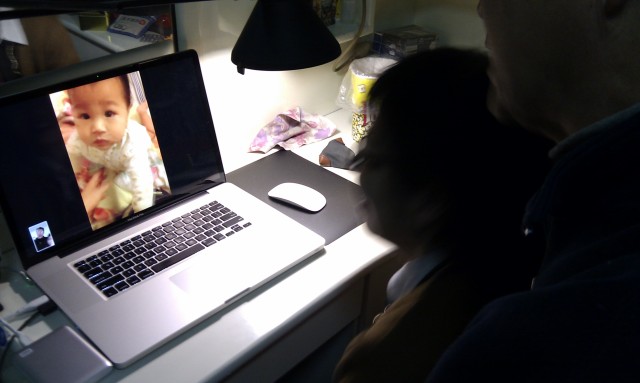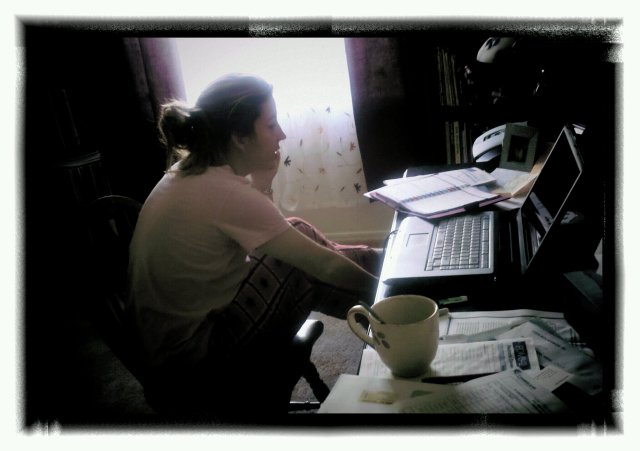Before Christmas I wrote the first of what I hope will be a series of three or four posts looking at how modern technology has changed expat life (hopefully for the better – although I think there is a sting in that tail and refer you to this post I wrote about facebook envy).
In my first post I looked at how the world of work has been affected and how much easier it is now for us all to work remotely. This is potentially a huge game changer for the expat partners who may otherwise have to give up their jobs or even career to follow their spouses overseas.
But technology is there to help us in many ways other than for work and in this post I am going to have a look at communication.
********
Way back when we lived overseas when I was a child, 99% of communication was done by letter (snailmail as it became known). Once a week we could send back and recieve letters through the diplomatic bag. Every post had a day when the bag came in; in every household eager wives (for it mainly was wives in those days) and children awaited news from home. Birthday presents, Christmas cards, even my O level results arrived this way, along with those long letters from parents and grandparents full of the news of Aunt Edna’s hip replacement and how the tomatoes were doing. It all seems so trivial but those everyday stories of home were what we craved. Every so often, we got a phone call – I remember this being the case when my grandmother died. But usually the only news we got from home was at least 5-7 days out of date.
To expats today this must all seem very strange. Can you imagine putting your child into boarding school and then having to wait a week to hear how they were getting on? Nowadays of course we have so many – maybe even TOO many – ways to communicate when we move away from our friends and family. Here are just a few of them:
Skype and FaceTime
There are of course now many more face-to-face ways to talk to people but these are prehaps the best known. Skype was the one that really broke down the barriers – for the first time we could not only speak to but see our loved ones without having to pay astronomical international call prices. FaceTime is useful because it is on phones and Ipds so more portable (ok I know, I am a bit backward here – you can get Skype on phones too now, right?). But both are excellent ways not just to talk but to share – how many grandparents have watched their grandkids growing up through the wonder of this kind of technology? Personally we have been able to build a great relationship with my broter-in-law in Florida thanks to Skype and FaceTime and there is nothing I like more than sitting down for a cup of coffee with friends in England, all over the internet.
Messenger, WhatsApp, Snap Chat etc
More immediate and probably now the most used type of communication is instant messaging. I love that you can connect so quickly and easily with anyone, anywhere in the world. Whilst Facebook is still perhaps the number one way people keep in touch with each others lives (see below for more on Facebook) I think we have started to move off the public pages and into more private spaces.
Of course we don’t just use these services to keep in touch with people back home or to communicate with friends new and old in other parts of the world; group messaging has become a real boon to expats making contacts and friends in a new country. What easier a way to organise a meet up than one Whats App group message? So much better than the old days of having to send separate emails or individual messages and then send them again when one person can’t make that particular time….
Expat Facebook groups
Another thing that I have noticed happening more and more commonly now is the use of groups for particular needs and interests and the ones aimed at expats have to be one of the greatest innovations to have hit the expat scene in a long while. As soon as you know where you are heading, you know you will probably be able to find a group to help you with your questions. I admin one here in Pretoria, where people come to ask questions about anything from where to get passport photos done to whether you need a pool heater (as an aside, there is good writing material in some of these groups – I always laugh when I see the posts asking whether anyone has a golf buggy for sale…). In the meantime, we have a separate “buy and sell” page which is a great place to get rid of all that stuff before you move on or conversely buy it when you first arrive; and (perhaps this is more pertinent to South Africa than many places) a travel page for sharing information about places to go and things to see.
Video and photo sharing sites
Another way we can keep in touch is by sharing our photos and videos. Some do prefer just to do this via facebook but equally many prefer to keep these things private. You can set up a You Tube video channel and set the settings to ensure only people you invite can view, and there are also lots of cloud-sharing photo sites (I am told Flickr is good for this, as well as Google Photos). So when you store your photos you can alert your parents back home and they can view at leisure. No more labouriously sending photos back as email attachments, two or three at a time (particularly painful for those of us without a speedy internet connection).
Blogs
Finally, I had to include this one as of course one of my main methods of communication is via my blog! In my case, it is not really aimed at friends and family but many people do initially set up a blog in order to keep the folks back home abreast of their new, shiny overseas life. In a way it is just a public diary for many people (although how public is up to you – again, like a YouTube channel, you can set it up so that only chosen viewers can see it). But even if this is not the intention of a blog site it is still a way to communicate. I, for one, have met several people in real life thanks to my blog – and have many more friends who I have never actually met but who I have close and important relationships with because they found me this way. After all, it is just a way of bringing people together with a commonality so why not use it as a basis to make friendships?
********
So those are our main communication channels – let me know if you think I have left anything out. Next time I want to look at ways that we use modern technology for travel. After all, for so many of us travel is one of the more important aspects of our lives – so we may as well use the best tools available to help us enjoy it.
Photo credit: Yining Zhang






